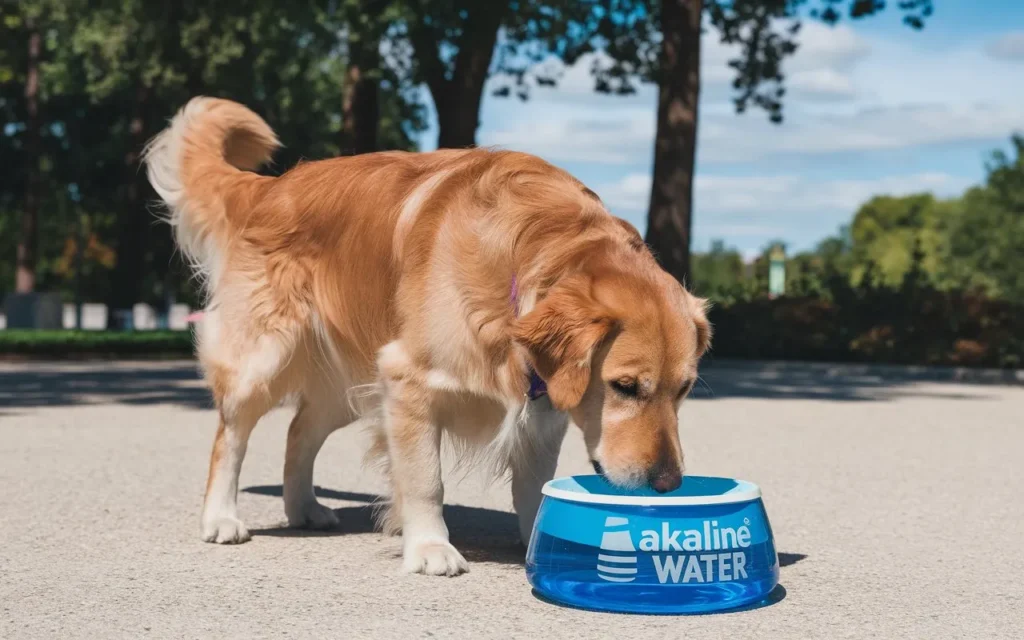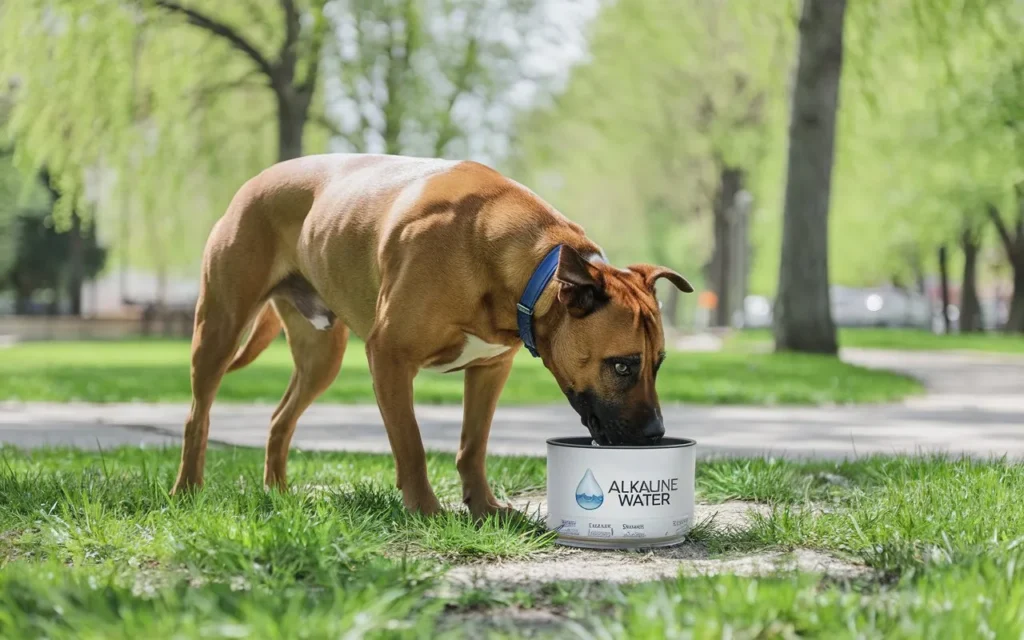As a devoted pet owner, you’re always looking for ways to improve your furry friend’s health. Consequently, you might be wondering, “Can dogs have alkaline As a devoted pet owner, you always seek ways to improve your furry friend’s health. You might wonder, “Can dogs have alkaline water?” This comprehensive guide explores the safety, benefits, and potential risks of giving alkaline water to your canine companion. We’ll also delve into related topics to help you make an informed decision about your dog’s hydration.
What Is Alkaline Water and How Does It Differ from Regular Water?
Alkaline water for dogs, or say alkaline water for animals, what is it? Alkaline water is made up of a pH level higher than regular drinking water. The normal water is between the neutral pH of 7. Alkaline water, on the other hand, is from 8 to 9 pH.
Water alkalinity is simply a measure of the amount or concentration of these minerals in our water supply. The minerals calcium, magnesium and potassium are alkaline minerals hence this determines the pH value in water. The presence of these minerals can affect the taste and, possibly, the benefits of your water.
Can Dogs Safely Consume Alkaline Water?
Now, let’s address the main question: can dogs have alkaline water? Generally, dogs can safely consume alkaline water in moderation. However, it’s crucial to understand both the potential benefits and risks for your furry friend.
Potential Benefits of Alkaline Water for Canines
- Improved Hydration: Some claim alkaline water may be more easily absorbed. This could lead to better hydration for your dog.
- Antioxidant Properties: Alkaline water may contain antioxidants. These could help neutralize free radicals in your dog’s body, potentially supporting overall health.
- Mineral Supplementation: Alkaline water often contains beneficial minerals. It may contribute to your dog’s nutritional intake.
- Potential Digestive Support: Some pet owners report digestive improvements. However, scientific evidence is limited.
Potential Risks and Considerations for Dogs Drinking Alkaline Water
While generally safe, there are factors to consider when giving dogs alkaline water:
- Disruption of Stomach Acid: Dogs’ stomachs are naturally acidic. This helps break down food and kill harmful bacteria. Regular consumption of alkaline water might disrupt this natural acidity.
- Overconsumption of Minerals: If your dog’s diet is already balanced, extra minerals could lead to imbalances.
- Individual Sensitivity: Some dogs may be sensitive to changes in water pH levels. This could potentially cause digestive upset.
Can Dogs Have Alkaline Water with Electrolytes?
Another common question is about dogs and alkaline water with electrolytes. Electrolytes are essential minerals. They play a crucial role in hydration and bodily functions. While beneficial, especially after exercise or in hot weather, consider these points:
- Moderation is Key: Offer alkaline water with electrolytes in moderation. It’s best after strenuous activity or during hot months.
- Consult Your Veterinarian: Always check with your vet before introducing new supplements.
- Choose Dog-Specific Products: Opt for electrolyte products formulated for canines, not human sports drinks.
- Monitor Your Dog’s Response: Watch for changes in behavior, digestion, or water consumption.
Is High Alkaline Water Safe for Dogs?
Some pet owners ask if dogs can have high alkaline water. This typically means water with a pH level of 9 or above. While dogs can drink it, caution is necessary:
- Gradual Introduction: Allow your dog’s system to adjust slowly. Introduce high alkaline water gradually.
- Dilution: Consider mixing high alkaline water with regular water. This reduces its pH level.
- Limited Consumption: Don’t replace all regular water with high alkaline water.
- Watch for Side Effects: Monitor for changes in thirst, urination habits, or digestion.

Factors to Consider When Giving Dogs Alkaline Water
If you’re thinking about giving your dog alkaline water, consider these factors:
- Your Dog’s Overall Health: Some health conditions may affect sensitivity to water pH changes.
- Age and Size: Puppies and small breeds might be more susceptible to pH changes.
- Current Diet: If your dog is on a special diet, consult your vet first.
- Water Quality: Ensure the alkaline water comes from a reputable source. It should be free from contaminants.
- Your Dog’s Preferences: Some dogs may not like the taste of alkaline water. Observe their reaction.
The Importance of Proper Hydration for Canine Health
Whether you choose alkaline or regular water, proper hydration is crucial. Here are tips to keep your dog well-hydrated:
- Fresh Water Access: Always provide clean, fresh water throughout the day.
- Multiple Water Stations: Set up several water bowls if you have a large house or multiple pets.
- Regular Bowl Cleaning: Clean water bowls daily to prevent bacteria growth.
- Monitor Water Intake: Watch your dog’s water consumption. Changes can indicate health issues.
- Wet Food Incorporation: Consider adding wet food to increase overall fluid intake.
Alternatives to Alkaline Water for Dogs
If you’re unsure about alkaline water, consider these alternatives:
- Filtered Water: Use a high-quality filter to remove impurities from tap water.
- Coconut Water: Offer small amounts of unsweetened coconut water as a treat.
- Bone Broth: Homemade bone broth provides hydration and nutrients.
- Hydrating Treats: Offer water-rich fruits and vegetables as treats.
How to Introduce Alkaline Water to Your Dog’s Diet
If you decide to give your dog alkaline water, follow these steps:
- Start Slowly: Begin with small amounts mixed with regular water.
- Observe Reactions: Watch for any changes in digestion or behavior.
- Increase Gradually: If no adverse effects occur, slowly increase the amount.
- Maintain Balance: Don’t completely replace regular water with alkaline water.
- Consult Your Vet: Keep your veterinarian informed about dietary changes.
Understanding pH Levels and Their Impact on Dogs
The pH scale ranges from 0 to 14. A pH of 7 is neutral. a pH level lower than 7 indicates acidity, while a pH level higher than 7 signifies alkalinity.. Here’s how pH levels can affect dogs:
- Stomach pH: A dog’s stomach is naturally acidic (pH 1-2). This helps digestion and fights bacteria.
- Blood pH: A dog’s blood should be slightly alkaline (pH 7.35-7.45). The body works hard to maintain this balance.
- Urine pH: Normal dog urine pH ranges from 6.0 to 6.5. Changes can indicate health issues.
- Water pH: Most tap water has a pH between 6.5 and 8.5. Alkaline water usually has a pH range between 8 and 9.
Understanding these pH levels can help you make informed decisions about your dog’s water intake.
Potential Health Benefits
While research is limited, some potential benefits of alkaline water for dogs include:
- Improved Hydration: The smaller water molecule clusters may enhance absorption.
- Antioxidant Effects: Alkaline water might help neutralize harmful free radicals.
- Acid-Buffer: It may help buffer acid in the bloodstream, potentially reducing inflammation.
- Mineral Supplementation: Alkaline water can provide essential minerals like calcium and magnesium.
- Improved Oxygen Delivery: Some claim it might enhance oxygen delivery to cells.
Remember, these benefits are not scientifically proven for dogs. Always seek advice from your veterinarian before implementing any changes.
Possible Drawbacks
While alkaline water can be safe for dogs, there are potential drawbacks:
- Disrupted Digestion: It might interfere with stomach acid, affecting digestion.
- Mineral Imbalances: Overconsumption could lead to mineral imbalances.
- Altered Medication Efficacy: It might affect how some medications are absorbed.
- Expense: Alkaline water can be more costly than regular filtered water.
- Lack of Regulation: The alkaline water market isn’t well-regulated, raising quality concerns.
Always prioritize your dog’s individual needs and consult with a professional.
Conclusion: Making the Best Choice for Your Dog’s Hydration
Well in short, yes dogs can drink alkaline water, but be careful. Think about what your pet actually needs. Of course, consult your veterinarian when making significant changes to either your dog’s original diet or water choices.
Just stay informed and keep an eye out on your dog. Whether you it goes through an alkaline, or simply standard system supplying water, make sure to always provide fresh new clean drinking water your pet. So, this is very important to ensure their health and happiness.

Frequently Asked Questions About Dogs and Alkaline Water
Introduce it gradually, starting once or twice a week. Observe your dog’s response before increasing frequency. Maintain a balance with regular water.
Can alkaline water help with my dog’s digestive issues?
Some owners report improvements, but scientific evidence is limited. Always consult your vet for digestive problems.
Is alkaline water safe for puppies?
Puppies have sensitive systems. Stick to regular, clean water for young dogs. Consult your vet before introducing alkaline water to puppies.
What about dogs on medication?
Consult your vet before introducing alkaline water if your dog takes medication. It could potentially affect medication absorption.
How can I tell if alkaline water is beneficial for my dog?
Look for signs like improved hydration, better coat quality, increased energy, and improved digestion. Monitor your pet’s health closely and consult your vet about any changes.
Can alkaline water prevent urinary tract infections?
While some claim alkaline water might help, there’s no scientific evidence to support this. Proper hydration with any clean water is crucial for urinary health.
Is bottled alkaline water better than home-filtered alkaline water for dogs?
Both can be suitable. Ensure bottled water is from a reputable source. Home-filtered options should use a high-quality filtration system.
Can alkaline water help with my dog’s bad breath?
Foul breath is commonly an indication of dental problems. While alkaline water might temporarily mask odors, it’s not a solution. Regular dental care is essential.
How long does it take to see effects of alkaline water in dogs?
Effects, if any, vary among dogs. Some owners report changes within weeks, while others see no difference. Consistent monitoring is key.
Can alkaline water replace electrolyte solutions for dehydrated dogs?
No, alkaline water isn’t a substitute for veterinary-approved electrolyte solutions. Always follow your vet’s advice for treating dehydration.
Keep in mind that each dog is different; a solution that benefits one may not be effective for another. Prioritize your pet’s individual needs and consult professionals when making dietary decisions.








